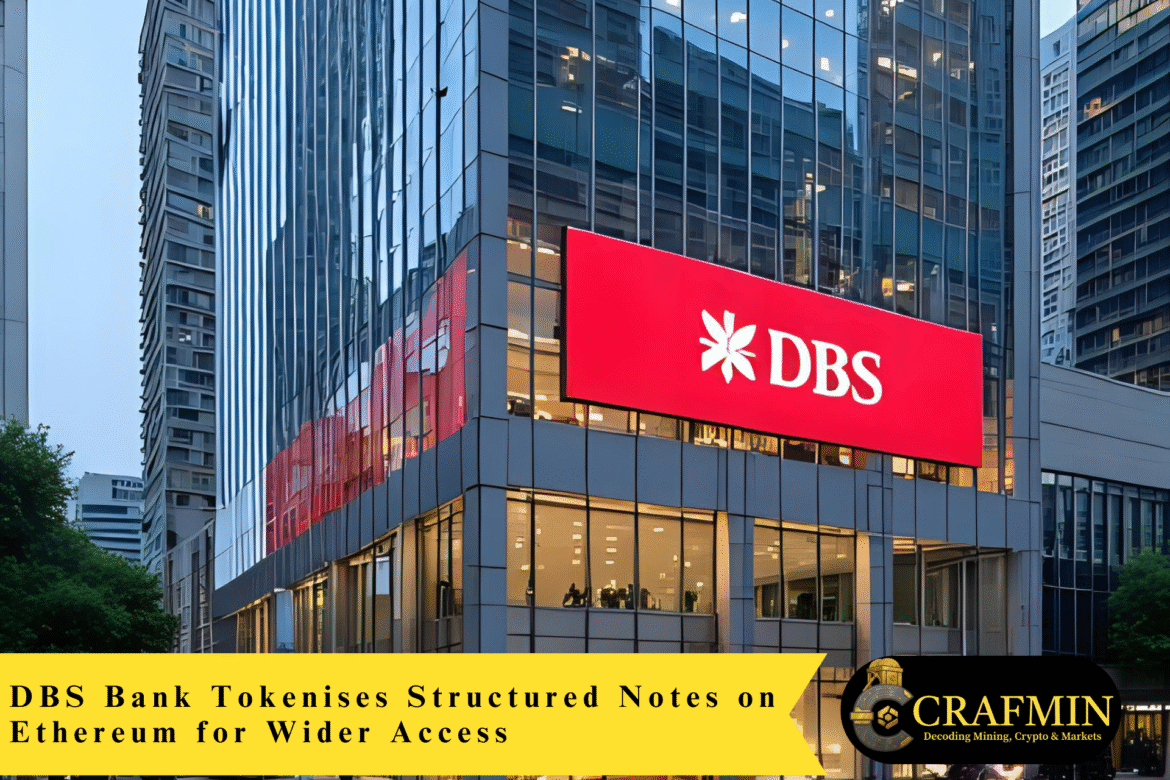DBS Bank, Singapore’s prime financial institution, is transforming access to sophisticated financial products for investors. The bank recently unveiled its launch of tokenised structured notes on the Ethereum blockchain, an advancement that lowers barriers to entry and enables wider participation.
The product allows investors to gain exposure to structured notes, which have so far been inaccessible to individuals but for the rich, through fractional ownership on blockchain platforms like ADDX, DigiFT, and HydraX.
DBS brings structured notes to Ethereum, opening access for everyday investors ( Image Source: AInvest )
Lowering Barriers through Tokenisation
Earlier, structured notes required a minimum investment of about USD 100,000, effectively cutting out small investors. With the use of tokenisation, DBS has reduced this minimum considerably. Each blockchain token now represents a portion of the USD 1,000 of the structured note, making the products liquid and accessible to more individuals.
Fractional ownership not only makes market liquidity more effective but also harmonizes with the general thrust of financial democratisation. By leveraging blockchain technology, DBS allows investors to engage in opportunities previously unachievable.
First Offering: Crypto-Linked Notes
The initial tokenised product wave appears in the shape of crypto-linked participation notes. These enable investors to access exposure to digital assets like Bitcoin and Ethereum without ever owning them outright. To those who are risk-averse regarding crypto volatility but desire exposure, this format provides a pragmatic compromise.
Crypto-linked notes provide a hedge against pure price risk with the potential for high returns. With DBS incorporating such notes into a blockchain platform, the shift unites traditional finance’s security and decentralised technology’s efficiency.
Growing Institutional Appetite
DBS reports strong institutional customer demand for derivatives relating to crypto. In just the first half of 2025, the bank traded USD 1 billion notional value in structured notes based on crypto assets with quarter-on-quarter expansion of almost 60%.
This increase is representative of how institutional players are turning increasingly to achieve crypto exposure while depending on stable banks for structured, risk-managed products. DBS is well-placed at the intersection of traditional finance and decentralized markets, offering solutions which cater to the needs to balance innovation and stability.
JUST IN: DBS BANK TO TOKENIZE STRUCTURED NOTES ON ETHEREUM FOR INSTITUTIONAL INVESTORS. #DBS #Ethereum #Tokenization #Fintech #Blockchain #InstitutionalInvestors #Crypto pic.twitter.com/EbADFuNYnw
— Crypto News Hunters (@CryptoNewsHntrs) August 21, 2025
Why Ethereum?
The use of Ethereum as the infrastructure of blockchain is not coincidental. As the most widely used smart contract platform, Ethereum has robust infrastructure, security, and scalability. Its established ecosystem makes it the ideal platform for high-value financial products.
For DBS, having Ethereum ensures third-party cross-platform compatibility and the possibility of an investor-friendly experience. As tokenized assets are gaining traction globally, Ethereum remains the preferred chain for institutions making it easier to bridge old and new finance.
Opening Up Access Via Partner Platforms
To distribute these tokenised structured notes, DBS is collaborating with platforms such as ADDX, DigiFT, and HydraX. These regulated marketplaces trade in digital securities and provide investors with easy access to tokenised assets.
By working with established third-party providers through collaboration, DBS ensures compliance, security, and investor trust. In return, it provides an scalable solution for accessing a larger pool of investors across markets.
A Step Towards Mainstream Tokenisation
The tokenization of structured notes is symptomatic of broader trends sweeping through finance around the world. Banks, asset managers, and regulators are increasingly having reasons to turn to blockchain as a way of improving efficiency, reducing costs, and increasing access.
For DBS, the move underlines its position as a pioneer in digital assets. It also serves to reflect growing convergence between old-style financial instruments and blockchain technology.
Also Read: Bitcoin Hyper Hyper Deploys Solana VM Powered Fastest Bitcoin Layer-2
Implications for Investors
For the institutional and retail investors, this innovation offers new possibilities. Fractional ownership of structured notes allows one to diversify portfolios without the old capital obstacles.
It also offers new levels of liquidity, as blockchain tokens can be more readily traded than traditional notes. Such flexibility can introduce an entire new class of investors willing to dip their toes in blockchain-supported products but still playing from the comfort zone of well-developed regulatory frameworks.
Looking Ahead
Tokenised structured note launch is just the beginning. With demand for blockchain-based solutions continuing to rise, DBS will increasingly have other classes of assets such as bonds, equities, or real estate securities.
With its strong institutional client base, regulatory acceptability, and trailblazing digital platforms, DBS is charting a course for how tokenisation will reshape finance in the years to come.

